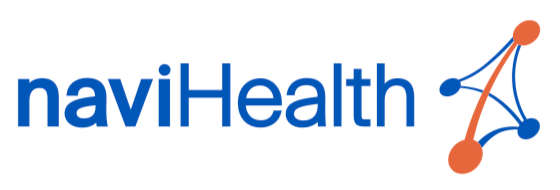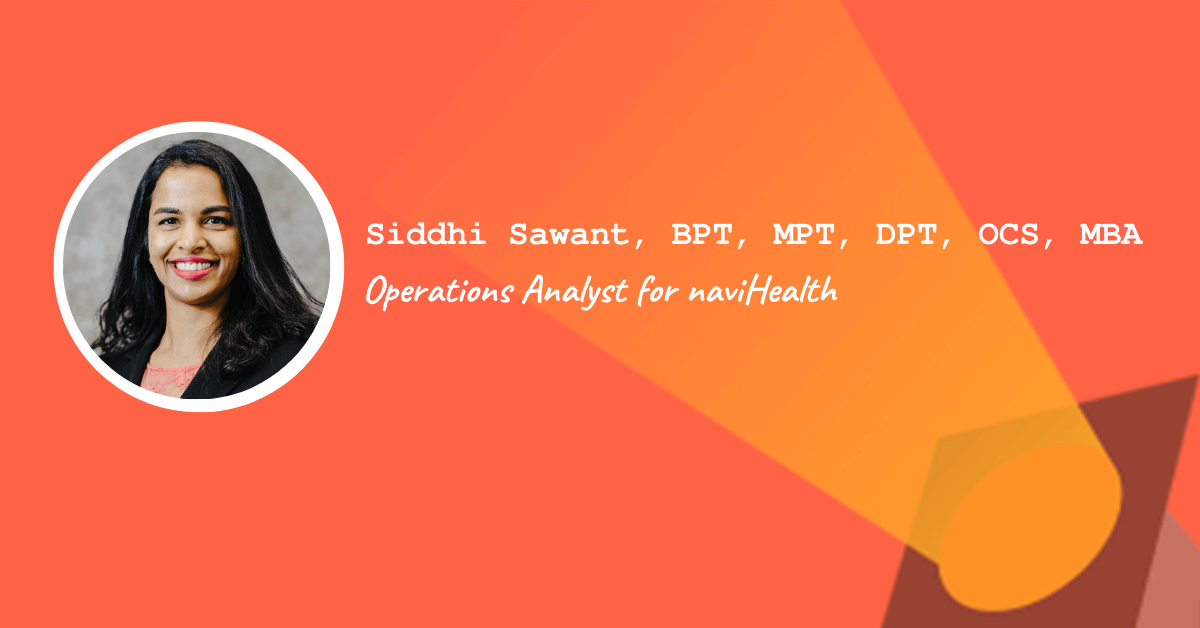This week’s spotlight features a physical therapist who now works as an Operations Analyst for naviHealth!
This post may contain affiliate links or codes. This won’t increase your cost, but it helps keep TNCPT alive, and free of annoying ads! Thank you for your support. 🙂
What is your full name, title, and company name for your current, primary role?
Siddhi Sawant, BPT, MPT, DPT, OCS, MBA – Operations Analyst for naviHealth.

Where are you located?
San Antonio, TX
Where did you go to PT school, and what year did you graduate?
MUHS (India, Bachelors 2012), MGH IHP (Boston, Masters 2013), and TTUHSC (Lubbock, Doctorate 2016)
What did you do when you first finished school, and for how long?
I was a clinical PT for 9 years.
In what setting(s) did you work, and what types of patients did you treat?
Inpatient Acute and Rehab, SNF (Geriatric), and Outpatient (Orthopedic and Sports).
What did you enjoy about your early roles? What didn’t you enjoy?
I enjoyed the variety of patients in outpatient and how I was able to use my background as a gymnast to help be a part of their recovery and go back to playing the sport or do the activity they love to do.
After 8 years it wasn’t intellectually challenging me anymore; I felt like I knew what to do with every patient I evaluated.
What else have you done since then, prior to your current role?
I applied for a MBA at UTSA and was accepted. I graduated in spring of 2022.
When and why did you decide to do something non-clinical?
My father is a businessman and it was always my first career choice until I fell in love with PT after an ACL injury during my career as a gymnast.
What are you doing these days?
I just finished my MBA and I’m enjoying my new role as an operations analyst. I also have a one year old son.
Are you still treating patients, or are you solely non-clinical?
I am solely non clinical, but I do plan on renewing my license long term.
How long have you been in your current role?
About 6 months.
How did you find your job?
I found it through connections.
Did you do anything special to your resume to land the job?
I spoke with my classmates and professors in the MBA program to help me improve my resume, and tailor it for the roles I was looking for.
What was the interview like for the operations analyst role?
It was very different from a clinician interview.
They wanted to understand if I’d be a good fit for their team, with respect to my skills and personality. They also dove deep into why I really wanted the position, and how it aligned with my long-term goals.
What are some of the things you did to stand out, take initiative, and advance in your career?
The MBA has taught me a lot and definitely helps me stand out.
My clinical background is something no one on my current team has, and they are very excited that they have me on board because of that.
How have people reacted to you leaving patient care?
They were surprised, but after I started my MBA they knew I was going to do something different sooner or later. What they did not expect was for it to be so soon!
What’s a typical day or week in the life like for you as an operations analyst?
A typical day is looking at data and seeing trends. I try to figure out if there is a way to do things better and more efficiently so insurance does not spend more money than they need to, and patients get the care they deserve.
I sit in on meetings with associates and executive directors to discuss, and then sit in on meetings with clients (insurance companies) to present our findings.
What are some of the rewards and challenges of your role?
The primary reward is that I am still making a difference in the lives of patients who need therapy.
My biggest challenge is learning many new skills, all at once. But I love being challenged!
How are the hours and pay compared to patient care?
The hours are flexible and I get to work from home, which definitely helps while I’m a new mother. The pay is higher, but I also just got an MBA.
Some people I spoke to mentioned that I will have to take a pay cut since I am transitioning careers, but I did not settle for less. I am glad my company pays me for my value.
What type of person do you think would do well as an operations analyst?
Someone who:
- Loves a challenge
- Can take on responsibility
- Has a curious mind
- Is not afraid to ask silly questions
- Works well on teams
Do you work remotely or onsite?
I get to work remotely.
Does your organization hire PT, OT, or SLP professionals into non-clinical roles? If so, what type of roles?
Yes, they do.
Examples include: Clinical Review Coordinator, Pre-Service Coordinator, Appeals and Denials, Cross Market Care Coordinator, etc.
What is a typical career path for someone in your role?
Once you learn the skills, you are responsible for a whole region and its clients.
You then move on to being an Operations Associate, then Senior Associate, and from there the possibilities are endless.
What is next for you? What are your high-level career aspirations?
I would like to stay in operations for a while, as it lets me interact with every business unit of the company. I am not closing any doors, however, and I do love marketing.
I plan on getting my PMP certification to add to my resume.
(See another spotlight on a PT who got her PMP and now works as an operations manager!)
What would you recommend to someone who is considering going into a role like yours? Do you have any special words of wisdom for the readers?
Some colleagues in my role have an MPH degree, so it may be worth considering an MPH or MBA if you want to be on a fast track for these roles.
You could also consider getting a lean six sigma certification, or a scrum certification. Taking advanced Excel courses will also help prepare you for becoming an operations analyst.
What would you like to change most in your profession, and why? How would you propose doing so?
I think all directors should get some kind of management degree to understand how to manage employees under them.
Getting an MBA made me see how things can be done very differently at a therapy clinic. But PTs become directors from years of experience and that should not be the only qualification for being a director.
What would you teach to today’s graduate students in your profession, if you had the opportunity?
I’d add a management class to PT school. It could be focused on professional development, or strategic planning.
Do you have any special advice for others who want to follow in your footsteps?
Do not limit yourself as a PT.
Networking has made me realize that there are so many jobs out there that value your skills. You have to find the right match to be happy at work.
Want to kickstart your own non-clinical career? We can help!





